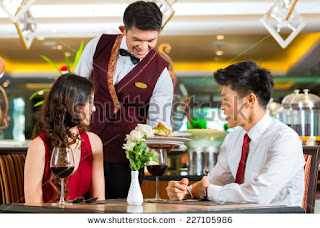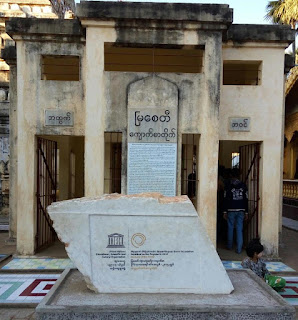English for Hotel and Catering Industry (Unit 13 - Describing dishes )
- Posted by zar ni (My Way!) on December 2, 2012 at 19:02
- ဒီသင္ခန္းစာမွာေတာ့ ဟင္းလ်ာအမ်ိဳးအစားေတြ၊ ဘယ္လိုခ်က္ျပဳတ္ထားတယ္၊ ဘာေတြနဲ႔ျပဳလုပ္ထားတယ္၊ ဘာအမယ္ေတြပါ၀င္တယ္ဆိုတာရွင္းျပႏိုင္ေအာင္ ေ၀ါဟာရေတြအသံုးအႏႈန္းေတြကိုေလ့လာၾကပါမယ္။
Unit 13 Describing dishes
(ဟင္းလ်ာမ်ားကိုေဖာ္ျပျခင္း)
What’s it made from
Customer
: Excuse me. Could you explain the
menu to us, please.
Waiter
: Yes, of course.
Customer
: What’s in the penne arribbiata?
Waiter
: Well, this is a pasta dish. It
consists of penne, a type of pasta, and
a chilli and tomato sauce. It’s made
from chilli, tomato, garlic and basil with pine nuts.
Customer
: Umm, sounds good. And what’s the
salmon coulibiac?
Waiter
: This is made from layers of rice mixed
with onions and mushroom,
Fresh salmons and hard-boiled eggs.
It’s wrapped in puff pastry and baked in the oven.
Customer
: And what’s the seafood dish?
Waiter
: This is a dish for two people. It
contains half a lobster, king
prawns, scallops and mussels. And
it’s served warm with a crisp, green salad.
စားပြဲထိုးေကာင္းတစ္ဦးမွာရွိသင့္တဲ့အရည္အခ်င္းေတြကို
အၾကမ္းျဖင့္အားျဖင့္ Skills and knowledge နဲ႔ Personal qualities
ႏွစ္ပိုင္း႔ခြဲျခားႏိုင္ပါတယ္။
Skills and knowledge ရဲ႕ေအာက္မွာ
Waiters and waitresses need to have:
- knowledge about menu items and wine (ဟင္းလ်ာစာရင္းနဲ႔၀ိုင္ေတြအေၾကာင္းေကာင္းစြာသိျခင္း)
- food and drink service skills (အစားအေသာက္တည္ခင္း၀န္ေဆာင္မႈစြမ္းရည္)
- knowledge of food health and safety (အစားအစာအဟာရႏွင့္ေဘးဥပါဒ္ကင္းေစရန္)
- good communication and people skills (လူမႈဆက္ဆံေရးစြမ္းရည္)
- organisational skills (ခ်ိန္သားကိုက္ေဆာင္ရြက္ႏိုင္မႈစြမ္းရည္)
- selling skills. (အေရာင္းစြမ္းရည္)
စတဲ့ကၽြမ္းက်င္မႈေတြရွိရမယ္လို႔ဆိုပါတယ္။
Personal Qualitiesရဲ႕ေအာက္မွာ
Waiters and waitresses need to be:
- friendly, helpful and polite (ရင္းႏွီးေဖာ္ေရြယဥ္ေက်းျခင္း)
- able to remain calm under pressure (ဖိအားေအာက္မွာတည္တည္ျငိမ္ၿငိမ္တံု႔ျပန္ႏိုင္ျခင္း)
- quick and efficient (လွ်င္ျမန္သြက္လက္၊ ထိေရာက္မႈရွိျခင္း)
- reliable and punctual (အားကိုးႏိုင္ရမည္။ အခ်ိန္မွန္ရမည္)
- tactful and diplomatic (လိမၼာပါးနပ္ေသာ၊ သံတမန္ကဲ့သို႔ပရိယာယ္ၾကြယ္၀ေသာ)
- able to work effectively in a team.(သင္းဖြဲ႕လုပ္ေဆာင္ႏိုင္စြမ္း)
စတဲ့အရည္အခ်င္းေတြရွိထားရပါမယ္။
ဒါေတြဟာအၾကမ္းဖ်င္းေျပာဆိုတာပါ။ ဒီသင္ခန္းစာနဲ႔တိုက္႐ိုက္သက္ဆိုင္တာကေတာ့
ကိုယ္ေရာင္းတဲ့ ဟင္းလ်ာစာရင္းအေၾကာင္း (menu) ကိုေကာင္းစြာနားလည္ထားၿပီး
ဧည့္သည္ကိုရွင္းျပႏိုင္ရပါမယ္။ ဒါမွသာ စားသံုးသူေတြ
ဘယ္ဟာကိုေရြးခ်ယ္ရမယ္ဆိုတာဆံုးျဖတ္ႏိုင္မွာျဖစ္ၿပီး
ေကာင္းမြန္တဲ့၀န္ေဆာင္မႈစြမ္းရည္ကိုျပသႏိုင္မွာျဖစ္ပါတယ္။
ေလ့လာထားရမည့္ expression မ်ား
Excuse me, could you explain the
menu to us, please? တဆိတ္ေလာက္။ ဒီမီႏူးေလးရွင္းျပလို႔ရမလား
What’s in the penne
arribbiata? “ပန္ေနးအရီဘီယာတာ” မွာဘာေတြပါလဲ။
This is a pasta dish.
ဒါကေတာ့ အီတာလ်ံ ပါစတာ ေခါက္ဆြဲဟင္းပြဲပါ။
It consists of penne, a type of
pasta, အီတာလ်ံေခါက္ဆြဲတစ္မ်ိဳးျဖစ္တဲ့ “ပန္ေနး” ပါပါတယ္။
It’s made from chilli, tomato,
garlic and basil. င႐ုတ္သီး၊ ခရမ္းခ်ဥ္သီး၊ ၾကက္သြန္ျဖဴနဲ႔ ပင္စိမ္း တို႔နဲ႔ျပဳလုပ္ထားပါတယ္။
This is made from layers of
rice. ထမင္း အလႊာကေလးေတြနဲ႔ျပဳလုပ္ထားပါတယ္။
It contains half a lobster,
king prawns, scallops and mussels. ပုဇြန္ထုပ္ၾကီး(ေက်ာက္ပုဇြန္) တစ္ျခမ္း၊
ကင္းပုဇြန္၊ ခံုးေကာင္နဲ႔ ေယာက္သြားေတြပါ၀င္ပါတယ္။
it’s served warm with a crisp, green
salad. ပူပူေႏြးေႏြး အၾကြပ္ေၾကာ္ေတြနဲ႔ ဟင္းရြက္သုပ္နဲ႔အတူ
တည္ခင္းဧည့္ခံပါတယ္။
ေလ့လာထားရမည့္ေ၀ါဟာရမ်ား
baked = ဖိုထဲတြင္ထည့္၍ဖုတ္သည္။
ကင္သည္။
butter knife =
ေထာပတ္ခပ္သည့္ဓါး
dessert fork =
အခ်ိဳပြဲစားသည့္ခက္ရင္း
fish fork = ငါးႏႊင္သည့္ခက္ရင္း
fish knife = ငါးႏႊင္သည့္ဓါး
flower arrangement =
ပန္းအလွျပင္
hard-boiled egg =
အကာေရာအႏွစ္ပါၾကက္ေအာင္ျပဳတ္ထားသည့္ၾကက္ဥ
layers = အလႊာ၊ အထပ္
mussels = ေယာက္သြား
napkin = လက္သုပ္ပု၀ါ
onion = ၾကက္သြန္နီ
pepper = င႐ုတ္ေကာင္း
puff = မလိုင္၊ ယို စသည္ ဌာပနာ ပါေသာ)
ၾကြပ္ရြသည့္ မုန္႔။
pastry = ဂ်ဳံမုန္႔ညက္ႏွင့္
ေထာပတ္တို႔ကို ဖုတ္ထား ေသာ ဖုံပြသည့္မုန္႔အကာ။
scallop = ခံုးေကာင္
spicy = စပ္ေသာ၊ ပူေသာ
tablecloth = စားပြဲခင္း
ေလ့လာထားရမည့္ ၀ါက်တည္ေဆာက္ပံုမ်ား
Present simple passive
Passive voice ကို
အရာ၀တၳဳေတြထုတ္လုပ္ပံု manufacturing process, reports and scientific writing
ေတြမွာသံုးေလ့ရွိပါတယ္။ ဒီမွာ ျပဳလုပ္သူဟာအေရးမႀကီးဘဲ ျပဳလုပ္ျခင္းခံရသည့္အရာ
(object) နဲ႔ ျပဳလုပ္ပံုျပဳလုပ္နည္း (action) ေတြကိုသာအဓိကထားေဖာ္ျပခ်င္တဲ့အတြက္
သူတို႔ကိုေရွ႕တန္းတင္ေဖာ္ျပၾကပါတယ္။
ဥပမာ
The chef makes ice cream from cream,
eggs, and sugar.
Ice cream is made from cream, eggs
and sugar.
The chef makes pancakes from eggs,
milk, and flour.
Pancakes are made from eggs, milk,
and flour.
ဒီနမူနာေတြမွာ Ice cream နဲ႔ pancake
ေတြကိုဘယ္သူလုပ္သလဲဆိုတာအေရးမႀကီးဘဲနဲ႔
ဘာေတြနဲ႔လုပ္သလဲဆိုတာသာေရွ႕တန္းတင္ေဖာ္ျပခ်င္တဲ့အခါ passive ကိုသံုးထားပါတယ္။
ျပဳလုပ္သူကိုေဖ်ာက္ထားလိုက္ပါတယ္။ (သို႔) ေနာက္တန္းပို႔လိုက္ပါတယ္။
Subject + finite form of to be
+ Past Participle
- ဒီအခါမွာ active sentence က object သည္ passive sentence မွာ subject ေနရာကို၀င္ယူပါတယ္။
- verb ကို past participle သို႔ေျပာင္းပါတယ္။
- active sentence က subject သည္ passive sentence မွာ object ေနရာေရာက္သြားပါတယ္။(ျဖဳတ္ခ်င္လည္းျဖဳတ္ခဲ့ႏိုင္ပါတယ္)
Tense
|
Subject
|
Verb
|
Object
|
|
Simple Present
|
Active:
|
Rita
|
writes
|
a letter.
|
Passive:
|
A letter
|
is written
|
by Rita.
|
|
ေလ့က်င့္ခန္း
၁။
ေအာက္ပါ၀ါက်တို႔ကို passive သို႔ေျပာင္းပါ။
1. We make pasta from flour, eggs
and salt.
2. You make a Margarita with
tequila.
3. The receptionist tells guests
about the hotel facilities.
4. The restaurant serves dinner from
7.30 to 11.00.
5. We make dressing from oil and
vinegar.
6. The waitress takes your order at
the table.
၂။ ေအာက္ပါတို႔ကို passive သံုး၍၀ါက်ဖြဲ႕ပါ။
e.g The table is laid in the
eveining.
table
lay
in the evening
table cloth
place
on the table
napkin
fold and
place on the side plate
knife and
fork
place
each side of the plate
wine glass
put
above the soup spoon
salt and
pepper
put
in the middle of the
table
main course plate
take
away
when the main course is finished
dessert spoon and
fork
bring
with the dessert menu
flower arrangement
place
next to the salt and
pepper
၃။ ေအာက္ပါေမးခြန္းမ်ားကို ေပးထားသည့္ prompt မ်ားသံုး၍ေျဖပါ။
1. What is ice cream made
from?
(cream / eggs/ sugar)
It's made from cream, eggs, and
sugar.
----------------------------------------------------------
2. What does a continental breakfast
consist of?
(fruit juice/ croissant or bread/
jam/ butter/ coffee)
----------------------------------------------------------
3. What does the mixed seafood dish
contain?
(lobster/ prawns / scallops/
mussels)
----------------------------------------------------------
4. What does a Margarita consist of?
(tequila / triple sec/ lime and
lemon juice/ ice)
----------------------------------------------------------
5. What is summer pudding made from?
(bread strips/ raspberries/ sugar)
----------------------------------------------------------
6. What vegetables does the
vegetarian bake contain?
(aubergines/ tomatoes/ onions/
broccoli/ mushrooms)
----------------------------------------------------------
ဇာနည္ (MyWay!)
Unit(12)
https://htooaungwintt.blogspot.com/2015/12/english-for-hotel-and-catering.html
Unit(14)
https://htooaungwintt.blogspot.com/2015/12/english-for-hotel-and-catering-industry_5.html



Comments
Post a Comment